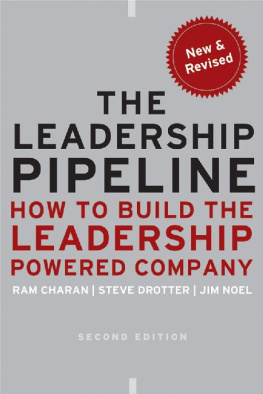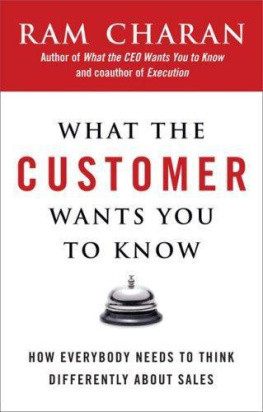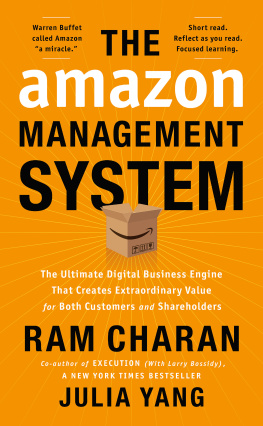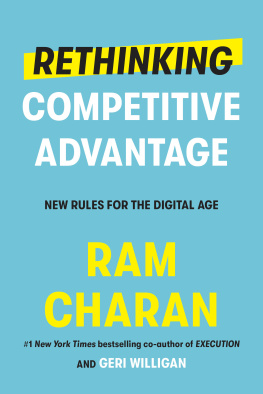ACKNOWLEDGMENTS
This book could not have been written without the close observation of skilled leaders who permitted me to travel with them on their journeys of personal development. I observed Larry Bossidy, former chairman and CEO of Honeywell International, repeatedly face tough business realities and lead confidently despite them, and continued to learn from him as we coauthored two books, Execution and Confronting Reality. Jack Welch, the former CEO of General Electric Company, showed me in 1997 how a leader can move with agility, speed, and flexibility to entirely revamp a huge corporations budget in a matter of weeks when a financial contagion swept the globe. More recently I have observed the decisive and bold actions of Chad Holliday, CEO of DuPont; Richard Noll, CEO of Hanes-brands; Azim Premji, Chairman of Wipro; Dave Calhoun, CEO of ACNielsen; and David Steiner, CEO of Waste Management, Inc. Their rapid and insightful response to the developing financial crisis demonstrated the value of speed and resolve in setting a new course for their companies.
This book also could not have been written without the superb editorial contributions of Geri Willigan, Charlie Burck and Doug Sease. Each of these skillful journalists helped me clarify my thinking and translate it into words on paper. My longtime friend John Joyce contributed his unique insight to the final product.
Special thanks to Mary Glenn, my editor at McGraw-Hill Professional, and Phil Ruppel, president of McGraw Hill Professional, for taking an early interest in this book and shepherding it quickly through the publishing process. They were ably assisted by marketing manager Gaya Vinay and publicity manager Kenya Henderson. Peter McCurdy, production manager at McGraw-Hill, turned the manuscript into the book you are holding in record time.
My deepest gratitude goes to my always cheerful, ever effective team in Dallas: Cynthia Burr, Carol Davis, and Karen Baker, who never failed to keep me and this project on track.
Finally, I must acknowledge those who set me on this course so many years ago when I was working in my familys shoe shop in India. The people of my village and those nearby learned the hard way to cope with crop failures and monsoons that brought even our simple businesses to a grinding halt for weeks at a time. Their legacy endures even in the complexity of modern business and I am deeply grateful to them for showing me the way.
MOVING FORWARD
I have kept this book short and to the point because your time is precious. My hope is that you have found it easy to read and digest and that you will heed its call to action. Roll up your sleeves and put the tools and ideas to work right away. Remember, hands on, head in is the guiding principle. Adjust your mindset, gather your people, and tackle the problems squarely. I have been gratified to see that some leaders are already doing just this by calling emergency meetings and asking their people to help generate ideas. The best of them are finding realistic solutions, communicating, and doing diligent, frequent follow-through.
If youre a capable leader, you will have a stronger business after the downturn than you did before. If youre a leader with vision, you are already wondering what comes next. It may be one year, it may be three or more, but there unquestionably will be a phase II. Actions generate reactions, and many business leaders and analysts expect the next phase to be inflationary since so much money has been pumped into the world financial system. This is not a forecast. It is simply a reminder that being a leader in tough and uncertain times means always anticipating the next challenge and building the fortitude and skills to face it.
ABOUT RAM CHARAN
Ram Charan is a world-renowned adviser to business leaders and corporate boards, a bestselling author, and an award-winning teacher. He is known for his keen insights into business problems and his real-world practicality in solving them.
For nearly four decades, Ram has counseled some of the worlds most successful business leaders on far-ranging issues, from corporate governance and CEO selection to leadership development and pursuing organic growth. Most recently he has been deeply involved in advising boards and CEOs on ways to cope with the mounting global economic slowdown.
Ram, a prolific writer, is the author or coauthor of fifteen books, including Know-How, What the CEO Wants You to Know, and Boards That Deliver. Execution, written with former Honeywell CEO Larry Bossidy, was on the New York Times bestseller list for nearly three years and has two million copies in print. Ram has contributed to lead articles in Fortune, Harvard Business Review, and many other publications.
Rams interactive style, his real-world approach, and the practicality of his lessons have made him a favorite among executive educators. He has taught for thirty consecutive years at GEs John F. Welch Leadership Center in Crotonville, New York, and has won best-teacher awards at Wharton and Northwestern.
Rams business career began when he was just a teenager, working in the family shoe shop in India. He went on to earn an engineering degree and then master of business administration and doctorate degrees from Harvard Business School. He graduated from Harvard with high distinction and was a Baker Scholar.
Ram is a director of Austin Industries, Tyco Electronics, and Emaar Manufacturing in India. He was elected a Distinguished Fellow of the National Academy of Human Resources in 2005. He is based in Dallas, Texas.
CHAPTER 1
THE CHALLENGE OF MANAGING IN A TOXIC ENVIRONMENT
Management challenges dont come any bigger than this. Its not just your business or industry that is in a downturn; the entire global economic system has been wounded. The liquidity crisis that erupted in September 2008 with the collapse of a few U.S. investment banks spread to businesses and consumers everywhere with a speed that left people as stunned as the victims of an automobile accident. By November virtually every major developed country in the world was either in recession or suffering from a wrenching slowdown in growth. Other countries whose economies are still growing also have felt the effects. Even Indias enviable 7 percent GDP growth rate is down considerably from its previous levels of around 9 percent, driving home the irrefutable point that the world is connected as never before, sometimes in unpredictable ways.
Projections and estimates in these circumstances are little more than guesses. In August 2008 who would have predicted that Wall Street as we knew it for 50 years would simply disappear? Accustomed as we were to the easy availability of capital, who would have imagined that credit would simply dry up on a global scale? Going forward, who can say how much capital will be available for expansion? Which countries and markets will contract, and at what rates? How long will the contraction lastor could it become a depression? Will disinflation give way to deflation, followed by a surge of inflation? We will not know when we have turned the corner, and we cannot envision the shape and scope of the world that will emerge. What we can be sure of is that this is a time of tumultuous change, and with change come both danger and opportunity.
The financial tsunami was a long time in the making, and its consequences inevitably will be with us for a long time. How long depends on how smart the various players around the world in government, finance, and business are in rebuilding the system. Credit is the oil of the economic engine, and credit ultimately is a creation of confidence. Until all players are confident about the intentions and strength of the others, there can only be stagnation.











